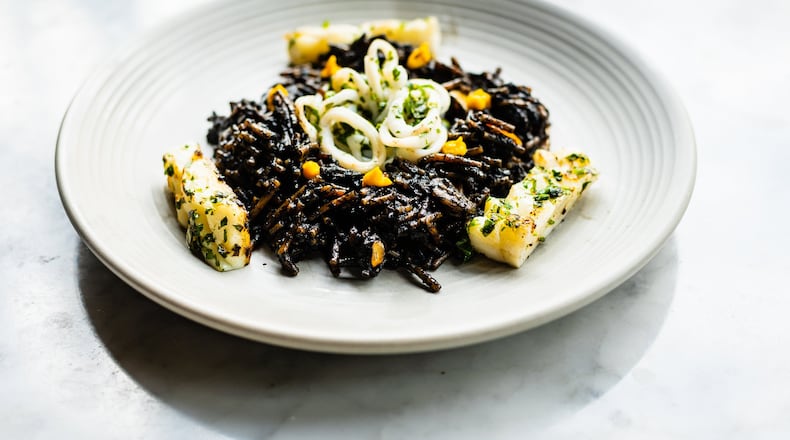The noodle world is so expansive throughout Asia, and pasta so integral to Italian cuisine, that it’s easy to overlook kitchens in other countries where thin strips of dried dough also get boiled and bubbled into tasty goodness.
Fideos (pronounced fee-DAY-ohs) is the Spanish word for noodles, and they are standard in homes and restaurants in Spain and Mexico, even if they aren’t the most prominent carbs for either cuisine.
Spanish fideo noodles are made of durum wheat, and can be as thin as angel hair or as thick as the average spaghetti strip. The dried noodles are sold packaged in round little nests or, more often, as 1-inch broken pieces. Unlike Italians, Spaniards typically don’t boil fideos in a pot of water. Rather, they cook them directly in a sauce, until they’ve absorbed the liquid to become tender and swollen.
In Atlanta, you can find such fideo treatment at Iberian Pig, whose menu staple holds the earthy flavors of shiitake mushrooms and the decadence of a poached egg plus black truffle.
Lesser seen in these parts is rossejat negro, a squid ink noodle dish from the Catalonia region of northwest Spain. Rossejat means “to toast,” so, for this dish, fideos first get browned in olive oil, to coax out a bit of nuttiness and to allow them to retain a toothsome, al dente texture, even once fully cooked, much like rice for paella.
As with paella, rossejat negro lends itself to large group gatherings, which is why it’s rarely offered at Iberian Pig’s sister restaurant Cooks & Soldiers. However, this black-as-night dish will make an appearance among specials at that West Midtown restaurant Oct. 14-20.
The rendition from Cook & Soldiers Executive Chef Matthew Ridgway comes with deep sea flavors courtesy of concentrated squid ink stock, along with the gentle heat of tomato-based Spanish mother sauce sofrito. Traditionally, calamari and fideos are simply stirred together in this one-pot wonder, but Ridgway gets fancy. He lays strips of meaty cuttlefish over the ensemble for a striking black-and-white contrast. He also adds pops of visual appeal and flavor, with yellow dabs of the French chile-garlic paste known as rouille and a few drops of a vinaigrette made with choricero, the Basque pepper of choice.
Fideos aren’t foreign to folks south of the U.S. border, either.
“Fideos, macaroni — we eat a lot of pasta in Mexico,” said chef Eddie Hernandez, co-owner of Taquería del Sol. “It fills you up for not much money.”
Hernandez noted that fideos frequently are a component of a filling Mexican lunchtime combo called comida corrida, which typically includes a scoop of noodles, a protein, a small salad of tomatoes and lettuce, a short stack of corn tortillas and a cup of soup. Hernandez likened it to a Southern meat-and-three plate.
Taquería del Sol patrons who frequent the chain’s metro Atlanta locations Oct. 14-19 will find this combo (sans the soup) as a special on the lunch and dinner menus. In Hernandez’s take, fideos are tossed in a tangy, acidic sauce of green tomatoes, jalapenos and onions that’s been cooked down, then pureed with bell peppers and cilantro, giving it pesto-like color and texture. Sharing the plate with the bright green fideos is a scrumptious pork stew made from the same green tomato sauce that dares you to rip those tortillas, swipe ’em through the sauce, and leave the plate squeaky clean.
“This is Mexican soul food,” Hernandez said.
Sí.
WHERE TO GET FIDEOS
Cooks & Soldiers. 691 14th St. NW, Atlanta. 404-996-2623, cooksandsoldiers.com.
The Iberian Pig. 121 Sycamore St., Decatur, 404-371-8800; and 3150 Roswell Road, Atlanta, 404-994-4990, theiberianpigatl.com.
Taquería del Sol. Various locations, taqueriadelsol.com.
About the Author


